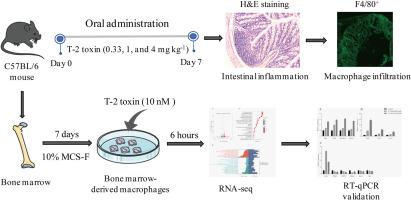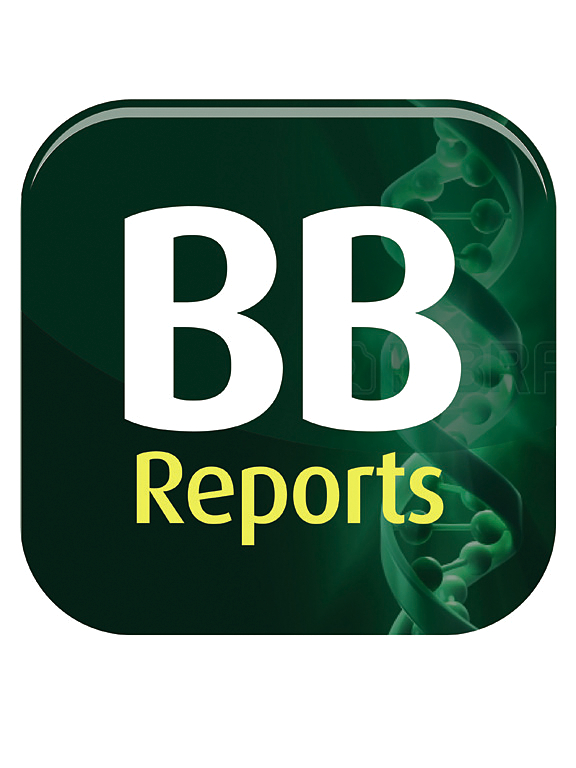T-2 毒素对肠道炎症和小鼠巨噬细胞炎症反应转录调控的影响
IF 2.2
Q3 BIOCHEMISTRY & MOLECULAR BIOLOGY
引用次数: 0
摘要
T-2 毒素是一种由致毒镰刀菌产生的真菌次级代谢产物,由于可能导致家畜和家禽肠道发炎,因此对谷物食品和饲料构成了重大威胁。巨噬细胞作为人体免疫系统的组成部分,在肠道炎症中发挥着至关重要的作用。本研究旨在阐明 T-2 毒素引发巨噬细胞炎症反应的机制。与对照组相比,灌胃 T-2 毒素(0.33、1 和 4 毫克/千克-1)会导致小鼠体重和采食量下降,并引起结肠组织病理学改变。此外,T-2 毒素还诱导巨噬细胞衍生的细胞因子(如 IL-1β、IL-6 和 TNF-α)上调,以及结肠中 F4/80+ 巨噬细胞数量的增加。T-2 毒素还导致小鼠骨髓源巨噬细胞(BMDMs)中的 IL-1β、IL-6 和 TNF-α 上调。此外,对暴露于T-2毒素(10 nM)的BMDMs进行的转录组分析发现,"TNF信号通路"、"脂质和动脉粥样硬化"、"Epstein-Barr病毒感染"、"MAPK信号通路 "和 "NF-kappa B信号通路 "是前五条显著富集的通路。随后,通过定量反转录 PCR(RT-qPCR)随机选择了 12 个炎症相关基因进行验证,结果与转录组分析的结果相吻合。对转录组数据的综合分析凸显了与 T-2 毒素诱导的 BMDMs 炎症反应相关的几种信号通路的激活,为预防和治疗 T-2 毒素诱导的肠道炎症提供了潜在的治疗靶点。本文章由计算机程序翻译,如有差异,请以英文原文为准。

Impact of T-2 toxin on intestinal inflammation and transcriptional regulation of inflammatory response in mouse macrophages
T-2 toxin, a fungal secondary metabolite produced by toxigenic Fusarium species, poses a significant threat to grain food and feed due to its potential to cause intestinal inflammation in livestock and poultry. Macrophages play a crucial role as integral components of the body's immune system during intestinal inflammation. This study aimed to elucidate the mechanism behind the inflammatory response triggered by T-2 toxin in macrophages. Compared to the control group, gavage administration of T-2 toxin (0.33, 1, and 4 mg kg−1) led to a decrease in body weight and feed intake, along with histopathological alterations in the colon of mice. In addition, T-2 toxin induced the upregulation of macrophage-derived cytokines like IL-1β, IL-6, and TNF-α, as well as a rise in the population of F4/80+ macrophages in the colon. T-2 toxin also led to the upregulation of IL-1β, IL-6, and TNF-α in mouse bone marrow-derived macrophages (BMDMs). Furthermore, the transcriptomic analysis of BMDMs exposed to T-2 toxin (10 nM) identified the "TNF signaling pathway," "Lipid and atherosclerosis," "Epstein-Barr virus infection," "MAPK signaling pathway," and the "NF-kappa B signaling pathway" as the top five significantly enriched pathways. Subsequently, twelve inflammation-related genes were randomly chosen for validation through quantitative reverse transcription PCR (RT-qPCR), with the results corroborating those from the transcriptomic analysis. The comprehensive analysis of transcriptome data highlights the activation of several signaling pathways associated with the inflammatory response following T-2 toxin-induced BMDMs, offering potential therapeutic targets for the prevention and treatment of T-2 toxin-induced intestinal inflammation.
求助全文
通过发布文献求助,成功后即可免费获取论文全文。
去求助
来源期刊

Biochemistry and Biophysics Reports
Biochemistry, Genetics and Molecular Biology-Biophysics
CiteScore
4.60
自引率
0.00%
发文量
191
审稿时长
59 days
期刊介绍:
Open access, online only, peer-reviewed international journal in the Life Sciences, established in 2014 Biochemistry and Biophysics Reports (BB Reports) publishes original research in all aspects of Biochemistry, Biophysics and related areas like Molecular and Cell Biology. BB Reports welcomes solid though more preliminary, descriptive and small scale results if they have the potential to stimulate and/or contribute to future research, leading to new insights or hypothesis. Primary criteria for acceptance is that the work is original, scientifically and technically sound and provides valuable knowledge to life sciences research. We strongly believe all results deserve to be published and documented for the advancement of science. BB Reports specifically appreciates receiving reports on: Negative results, Replication studies, Reanalysis of previous datasets.
 求助内容:
求助内容: 应助结果提醒方式:
应助结果提醒方式:


